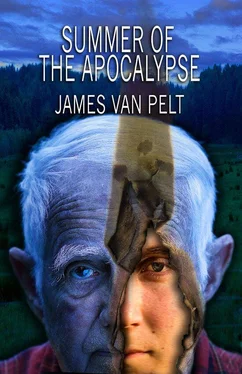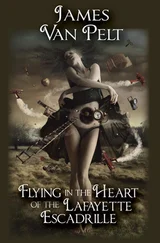A man behind Eric said, “Tears the flesh you say?”
“Oh, yes, very ugly wounds.”
“Wouldn’t want to hunt with one then.”
“No. They’re designed to kill people. Weapons of destruction.”
Another voice, a woman, said, “They’re part of Gone Time sickness.” Teach leaned toward Eric, “That’s Ripple. She’s a deep one.”
The woman looked at Eric intensely, a full eye lock, as if she were challenging him, and it took a second for him to break the stare and to see that she was young, maybe fifteen, like the Earth Dancer. Her face was skinny, and even by firelight Eric could see dark circles under her eyes.
“Yes, I suppose, but the world was dangerous, and America needed an army to keep itself safe.” She scooted forward on her bench, bent down and put her hands on the dirt. “No,” she said to her feet.
“Gone Time sickness had many symptoms. An army was one of them. M-16s were a symptom.”
“But you never lived there. Much was good then, too. A lot.” Eric felt tense, defensive. “It was a magic time. We could fly, don’t you see. We had great learning. Man knew things.”
“He’d forgotten all that was important.”
Eric thought, she’s so young. She knows nothing of me or my time.
As if she’d read his mind, she said, “I know myself. I know my time, and I’ve heard the stories. I’ve walked through the cities.” She drew a design in the dirt at her feet. Eric found it odd that she spoke to the Earth, and then he thought, she’s like the Earth Dancer, drawing designs, and he wanted to leap up and look at what she was making, to see if it were a noose.
“None of you were native,” she continued. “The sickness came from not belonging. All the symptoms. None of you belonged.”
“Go on,” he said, suddenly eager to hear what she might say.
“None of you were native. You had no place you knew of as your own, and because of that you lived in all places as if you didn’t belong. You made an army because you feared being thrown out. You were always temporary.”
“You mean we weren’t Indians? My family had lived in America for several generations.”
“No,” she said, shaking her head, sitting up and looking at him again. The rest of the people, surely the whole population, listened intently. All the benches were filled. Eric guessed maybe sixty people sat around him. A log popped sharply in the fire sending a shower of sparks up with the smoke. “Birth doesn’t make you native. It’s a matter of life and mind.”
People nodded around her.
“Gone Timers, most of them, lived on land they didn’t know. It’s true, isn’t it, that most Gone Timers didn’t build the houses they lived in?”
“That’s true, but our technology freed us from… from… some tasks. We could devote our lives to learning.”
“You could, but did you? What you did is what counts, not what you could have done. You didn’t build your own houses, but you lived in them. You didn’t make your own clothes, but you wore them. What’s important though, what’s important is that you didn’t know where anything came from. Your house, your clothes, your food, your light, your medicine, your entertainment, even your water. You turned on a tap, and water magically poured out. You flushed a toilet and wastes disappeared. You put your garbage on the street, and others took it away.”
“Well, yes, you could look at it that way, but what does that mean? What does that have to do with being native? How does that make the Gone Time sick? We were advanced; we could go to the moon. We could cure sicknesses.”
She said, “Not the last one.”
Pushed by a breeze, smoke watered Eric’s eyes. He turned away from the fire. She said again, “Not the last one. But it doesn’t matter. The real sickness was in life and mind. Gone Timers lived in the world like the world didn’t matter. They took upstream and disposed downstream like upstream was forever and no one lived below. The sickness was in metal and coal, in gasoline, in things that could not grow back. The end was inevitable, one way or another.” Eric wondered if Troy and Rabbit were bored. Ripple was preaching, he realized, and a sermon is often a bore, but they were listening too.
Ripple said, “There isn’t a rock here that I don’t know. Every tree, as far as I can walk, I have seen and touched. I place my hands in the stream and I feel the connection to all the water everywhere, to the liquid in my veins. Everything I eat, I know. I am careful with my wastes. I read in a book the saying, ‘Don’t shit where you eat,’ but Gone Timers always shit where someone else ate, and ultimately, because it’s all connected, in their own plates.”
A child giggled. Someone hushed it quietly.
“I share…” she said, “…space with all the living things. If I take a deer, I pray for a deer somewhere to be born to replace it. If I harvest a plant, I see that I leave the ground ready for another. When I die, I will leave a place that another can live. I am native. I belong.”
“That’s a nice idea,” he said. “But people couldn’t live like that, not in Gone Time numbers. Mankind was successful. We learned how to make the work of a few feed and clothe many. We spread out, like grass; we covered the ground, and what we made was beautiful. You said you walked through the cities. Did you look? Did you really look? And what did you see?”
A vision of Denver at night rose in Eric’s head. He said, “Lights everywhere: street lights, lights in homes, advertisements blinking on and on into the darkness. Cars hissing the pavement dry on rainy nights. Laughter. People laughing, coming out of theaters. And concerts, 70,000 people in Mile-High Stadium on their feet feeling music pounding in their chests. Heart-stopping rock-and-roll so loud your skin hurt. That was beauty, human beauty, and there was nothing sick about it. A good time, my father’s time.”
“Knowledge too, pure knowledge. We were close, so close to knowing everything. I’ve seen the books. I know. Scientists could study particles so small that an atom was their universe.” He knew most of the people around the fire would have no idea what he was talking about, but he continued. “We studied the galaxies. We looked out with telescopes and electronic measuring devices and saw the face of god. Mankind reached up and in. Backwards and forwards. Our science traveled everywhere, and that’s what we’re losing now. Our children, my own son, are forgetting the heights we reached. My dad…” he said, “…my dad’s world, my world, was about making people live. We lived longer and healthier. We took care of our teeth. We helped the nearsighted. We reached out, the Americans, we reached out and helped people thousands of miles away in other parts of the world. Technology and science made us more compassionate, more human.”
Ripple looked at him sadly. “The beauty you’re talking about is denial. It was terminal, the false color of fever before death.”
Taken aback, Eric said, “Where do you get words like that? Those are Gone Time terms. How old are you?”
She blushed. “Books. I’ve read and talked. I’ve thought. I’m sixteen.” Teach said, “She has, too. Ferocious memory.” He turned to Ripple. “A little overpowering at times, too.”
Ripple said, “He’s been there, Teach. He knows that it’s true.” A voice from behind Eric said, “What do you think about the Jackals with M-16s?” He pronounced the name of the gun carefully, making it three words. “They seem more Gone Time than now.”
Eric said, “Teach, you said the roads were closed. Your parents dynamited them.”
“They did, but foot traffic has no problem going over the blockade. This is the first they’ve come this far in force, though.”
Читать дальше












